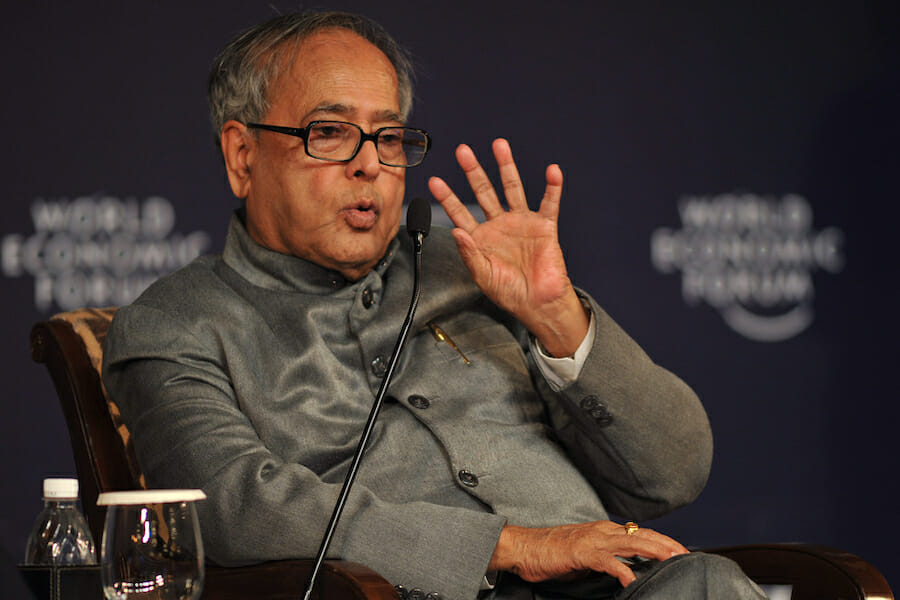
Repentant ‘Tax Terrorists’ and Other Signs of Change in New Delhi
From senior government officials working longer hours and cutting back on their golf game, to the emphasis on Hindi in official documents, there are plenty of signs that a new order is descending on Delhi. But perhaps the most poignant so far is the way Pranab K. Mukherjee, currently the president of India, has been forced into a public renunciation of the very tax policies he pursued just two years ago when he was finance minister.
The most significant consequence of the horrific November 2008 terrorist assault in Mumbai was actually self-inflicted. The talented Palaniappan Chidambaram was shifted out of the finance ministry in order to whip the feckless home ministry into shape. Mukherjee was appointed to fill the resulting vacancy, reprising an entirely unmemorable stint as finance minister in the early 1980s. Significantly, while Chidambaram was an enthusiastic champion of the key economic reforms of the early 1990s when he was serving as commerce minister, Mukherjee was virtually invisible despite then heading up the Planning Commission, a key economic planning agency.
His second stint at the finance ministry, from early 2009 to mid-2012, was nothing short of disastrous. He remained complacent as the global economic meltdown started to weigh in on India, preferring to emphasize expensive social welfare projects instead of productivity-enhancing structural reforms.
The budget he formulated in early 2011 was bereft of any serious commitment to rein in profligate spending and was laced with roseate assumptions that were quickly proved unfounded. And the following year’s budget was so out of touch that a distinguished observer noted it was “shocking that a finance minister can ignore all the problems that he faces.”
Mukherjee’s tenure ended when he was kicked upstairs to the Indian presidency, the largely ceremonial head-of-state post. By then India, hailed as the next China just a few years earlier, was being called the “first BRIC fallen angel,” the “Greece of Asia” and a “gasping elephant.” The global rating agency Standard & Poors was threatening to downgrade the country’s sovereign debt credit rating. The announcement that economic growth in the first quarter of 2012 had declined to 5.3 percent, from over 8 percent just over a year earlier was so shocking that headlines in the Economic Times screamed: “Goodbye 2020, Hello 1991!” A Congress Party leader was even quoted as saying that “We have to rescue the economy from the ravages of Pranab Mukherjee.”
Most damagingly was the wrecking ball Mukherjee took to India’s reputation among global investors. Searching for ways to pay for costly social spending, he devised exasperating tax policies directed at foreign companies doing business in India – this at the very moment when India should have been pulling out the stops to attract more overseas investment. The most egregious case in point concerns Vodafone, the London-based telecommunications company, which in 2007 spent $11 billion to buy from a Hong Kong conglomerate majority ownership of what is now the second-largest telecommunications company in India.
Vodafone was subsequently hit with a $2.2 billion tax bill on its purchase. The company resisted, arguing that the transaction was executed by offshore vehicles of the two principals and that in any case, Vodafone was not the seller of the assets and so could not possibly be liable for a capital-gains tax. After an extensive legal battle, the Indian supreme court in early 2012 agreed and reproached the government for overreaching its authority.
Having thus failed to prevail in the courts, Mukherjee attempted to re-write the law by proposing a retroactive tax on capital gains arising from cross-border purchases of Indian assets dating back 50 years, a piece of legislation that only furthered India’s reputation as an inhospitable investment destination. According to Sanjaya Baru’s new book, Mukherjee gave then-Prime Minister Manmohan Singh — his nominal boss — just one day’s notice that he was going to introduce the legislation. The proposal provoked seven business associations from the US, the UK, Canada, Japan, and Hong Kong to write a joint letter to Singh, warning that it “has called into question the very rule of law.”
The concept of retroactive taxation also drew strong criticism from the BJP, which labeled it “tax terrorism” in its recent election manifesto. In its first official policy statement, Prime Minister Narendra Modi’s newly-elected government pledged to re-work the current tax regime so that it’s “non-adversarial and conducive to investment, enterprise, and growth.” It also promised to “create a policy environment which is predictable, transparent and fair.”
The irony is that this repudiation of the way Mukherjee approached things while at the finance ministry was issued not by Modi but by Mukherjee, who was discharging the traditional duty of the Indian president in outlining a new government’s agenda to a joint session of Parliament. It’s a stark irony that many commentators overlooked, though it has much more import for the country’s prospects than the numerous stories in the press these days about miffed ministers and inconvenienced mandarins.
